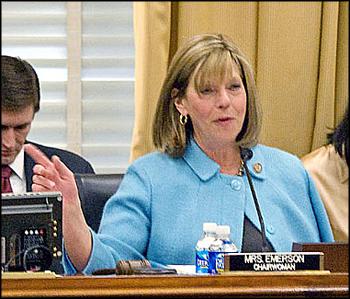
New data from the Congressional Budget Office measures the share of federal debt per person in the U.S. in the recent past, the present and the future. It is stark and startling, but in a single generation the figure is set to triple.
In 2008, each American's share of the federal debt was $35,000. Today, only four years later, it is $50,000. In 2037, every American will be $147,000 in debt as a result of reckless spending, runaway programs and the inability of policymakers to come up with smart solutions today so we can avoid tough choices tomorrow.
And the numbers get bigger against the backdrop of American households, rather than individual citizens: in 2037, every family will bear $382,000 of federal debt -- just 25 years from today.
Imagine those figures next time you drive down the street in your neighborhood. Every house you count represents $95,000 in federal debt today. Every five driveways you pass is $500,000 today... and nearly $2 million in 25 years. In a Missouri city with a population of 1,000 people, the total represents $50 million of federal debt.
Stopping the accumulation of this massive debt depends on two things: the revenues the government takes in and the expenditures the government pays out. Both can be part of the solution.
On the revenue side, economic growth can make a substantial contribution to the federal balance sheet. We should invest in job-creating policies and refrain from regulations that slow growth and kill jobs. Tax fairness is important, too, to prevent fraud and to promote a level playing field for all Americans.
On the spending side, there is even more room for progress. By looking at the tax dollars we spent yesterday, today and tomorrow, we can reduce future federal deficits. I wrote legislation, for example, that trims $2 billion from the President's budget for the Treasury, the IRS, GSA and the 9th Circuit Court of Appeals in 2013. I'll fight to get that significant reduction enacted into law. If we win this argument in Congress and with the White House, we will have cut more than 12 percent in this area of federal spending since 2010.
And we have to assess the long-term health of federal programs for the possible reforms that not only save tax dollars, but keep important benefits alive and intact for the next generation. When the trustees of programs like Medicare and Social Security say they are going broke, we have to pay attention. One side wants to pay for these programs with higher taxes, and the other side wants to find reforms that extend them for future generations without changing terms or benefits for Americans drawing on them today.
Because if we anticipate our children's shares of the federal debt to triple in one generation -- and we do -- then we must be mindful of the legacy they can expect to leave their children, our grandchildren, in the generation after that.
Jo Ann Emerson of Cape Girardeau represents the Eighth District of Missouri in the U.S. House of Representatives. Her Cape Girardeau Office may be reached at 573-335-0101.
Link of Interest

By Jo Ann Emerson
Something amazing happened in Bourbon, Missouri last week. Two weeks prior to Memorial Day, a group of veterans and family members gathered at American Legion Post #81 in Bourbon to dedicate their new building. And on the program was a woman named Sheila Wood.
I started working with Sheila in September of last year to get her cousin, 2nd Lieutenant Dean Gilroy Murphy, the Purple Heart he earned when he was injured at Iwo Jima 67 years ago. His story is a definitive one of military service during World War II, only with a tragic end. From Camp Pendleton in California, Lieutenant Murphy shipped out on November 12, 1944. He died on April 7, 1945, during the turning-point battle of the Pacific Theater in World War II, twenty days before he would have turned 21 years old.
The family never claimed Lieutenant Murphy’s Purple Heart until cousin Sheila took on the project last September. We had the medal from the Department of Defense by December.
Last week, as we dedicated the American Legion Post in Bourbon, the Murphy family bestowed Lieutenant Murphy’s Purple Heart on the Post. They entrusted it to the American Legion with the understanding that the medal would be displayed so that Lieutenant Murphy would not be forgotten, as the award itself had been forgotten, for so long.
Ceremonies involving our veterans and their belated awards are always moving and always special, but this one was especially wonderful. So many American heroes are overlooked because of their modesty. So many tales of bravery and sacrifice are never passed on. So many honors and awards end up in drawers and lock boxes when they should be shared. Yet, these virtues cannot survive from one generation to the next unless we talk about them.
Blood, sweat and tears are contained in each Purple Heart awarded by our country. The medal represents an incredible cost in human terms to entire families. Without Americans who are willing to sacrifice for our nation and our freedoms, however, we would all be lost. So we must know these stories and we must remember them.
Since the Purple Heart was established in 1932, it has honored the bravery and the pain endured by exceptional men and women in the service of our country. For 80 years, these medals have been bestowed on patriots and heroes. Purple Hearts are not recommended; they are earned. It is the oldest military award still given to U.S. servicemembers.
And each Purple Heart has its own story. They are attached to veterans who put our country before themselves, and the circumstances of their sacrifices teach us a lot about the cost of the freedoms we treasure as Americans. Now, Lieutenant Murphy’s story can be told and remembered.
His is a Purple Heart for all of Missouri.
I’m so glad to tell his story, to honor his service and to thank his family for making such a selfless gift to their community.
Jo Ann Emerson of Cape Girardeau represents the Eighth District of Missouri in the U.S. House of Representatives. Her Cape Girardeau Office may be reached at 573-335-0101.
Link of Interest

By Jo Ann Emerson
The regulatory reach of the federal bureaucracy has reached disturbing levels. In Southern Missouri, we know the interest of federal agencies in regulating our lives includes dust on farms, milk storage on dairies, the freedom of our children to work in agriculture, access to roads and rivers, and the lead in fishing tackle, ammunition and the tire stem valves of ATV’s. The ozone produced by traffic on our interstates, this Administration says, could require our rural counties to shut down manufacturing businesses and eliminate local jobs.
More sweeping regulations are on the table, too, like the individual mandate to purchase health insurance, taxes on energy and manipulation of domestic resources, and water and air quality standards that bring every inch of American soil under the jurisdiction of the Environmental Protection Agency. A few of these examples have found their way into law over the objections of right-minded legislators, others are federal regulations, and some are proposals which have been temporarily shelved by the administration.
This last category is of the greatest concern. Congress can fight rules, regulations and overreach, but we cannot stop the Administration from thinking up new ways to undermine our economy and then putting them on ice.
And the outsized effect of these mostly-environmental regulations falls disproportionately on rural areas in the middle of the country. Manufacturing, agriculture and transportation are hit hardest by federal policies that pressure energy prices and restrict our ability to draw on the natural resources all around us.
The simple threat of these extreme regulations has a real effect on employers, communities and taxpayers, even if they are never implemented. But there is always the risk that they will be.
In the event that the president is not re-elected, a flurry of last-minute regulation could occur as this Administration goes out the door. Not only does this prospect cause great uncertainty for American businesses large and small, it also worries good government groups which do not believe an outgoing Administration should be allowed to effectively bind the hands of an incoming president. When that happens, the regulatory tangle can take years to untie. In the meanwhile, the economy and the country suffer.
It is one thing, of course, to urge restraint on this kind of aggressive regulation, but it is entirely another to prevent it in advance.
For starters, the Administration should be urged to exercise restraint, transparency and reason. I’m not sure that is a practical goal, given the fact that no previous White House has so dramatically expanded the regulatory reach of government into the private lives of American families and businesses.
Certainly, the pressure Congress and the public have applied to prevent many of these onerous regulations from moving forward should be kept up. We have to keep making the case for rural America and the families who make their living there.
But most importantly, this Congress and the next one should be prepared to quickly attack any of these efforts by this Administration to regulate on its way out the door. We will be.
Jo Ann Emerson of Cape Girardeau represents the Eighth District of Missouri in the U.S. House of Representatives. Her
Cape Girardeau Office may be reached at 573-335-0101.
Link of Interest

By Jo Ann Emerson
All the attention at the Supreme Court this spring has been focused on the challenge to the 2010 health care reform law, but there is another important case before the highest court in the nation with considerable consequences for immigration policy.
The federal government is suing the State of Arizona over a law that allows the state to enforce a policy against illegal immigration, requiring aliens to supply proof of their legal presence in the country. In the absence of adequate federal efforts to keep illegal immigrants from entering Arizona, the state took matters into its own hands, citing the enormous cost of supporting illegal aliens through public programs. And the costs are significant; by one estimate, illegal immigration cost Arizona $2.7 billion in 2009.
It is also true that federal efforts to control the U.S. border need serious help. The task of patrolling our 1,969-mile southern border falls to some 17,000 agents who need far better support from technology and even local law enforcement. In 2011, agents totaled a 40-year low in the number of arrests of illegal border crossings.Border enforcement is necessary, too, because in addition to illegal entrants to the country, the border is illegally crossed by drug traffickers, gangs, weapons smugglers and kidnappers in both directions.
The Supreme Court will decide whether Arizona has a right to protect its territory and its taxpayers from illegal immigration, and the result of the case will send a key signal to other states contemplating similar laws. In the meantime, written and unwritten federal policies like “catch-and-release” soften the stance against illegal immigration. Even in Southern Missouri, we have had experiences with federal agents simply instructing local sheriffs to let illegal immigrants go.
Lax enforcement of uncertain federal immigration policies both encourages illegal aliens to break the law in coming to America and undermines the legal system of immigration for those who follow the rules. Arizona should not have to enact a law simply because the federal government will not enforce the laws on the books.
Repairing the system starts with better enforcement, clearer laws, more cooperation between federal and local authorities, and a secure border. Without those things, more states will be inclines to take matters into their own hands, like Arizona has.
Immigrants who choose the legal path to their presence in the U.S. are participating in an historic tradition of starting a new life in America. On May 1, I proudly attended the naturalization of 17 new U.S. citizens at the federal courthouse in Cape Girardeau. These Americans worked hard to comply with the laws of the land they hoped to make their own. They didn’t choose the easy, illegal path.
When it comes to making the tough decisions about our response to illegal immigration in the U.S., we should not choose the easy path, either. Arizona’s law should be upheld by the Supreme Court, but that decision will only prove how much more work we have to do at the federal level to secure our borders.
Jo Ann Emerson of Cape Girardeau represents the Eighth District of Missouri in the U.S. House of Representatives. Her District Office is Cape Girardeau may be reached at 573-335-0101.

By Jo Ann Emerson
There is no end to the appetite of this administration to regulate the lives, livelihoods, private decisions and private property of the American people. The latest example of the aggressive agenda of the federal bureaucracy is, not surprisingly, by the Environmental Protection Agency.
Together with the U.S. Army Corps of Engineers, the EPA has drafted “guidance” that signals the Administration’s intention to dramatically expand what it considers to be “navigable waters of the United States” to include simply “waters of the United States. The expansion of this regulatory categorization means that streambeds with a trickle of water running through them, culverts which are bone dry for 50 weeks each year, even the water in a swimming pool or the snow on Pike’s Peak would fall under the jurisdiction of the federal government.
And the EPA already uses its authority with aggression and vigor that carries incomprehensible penalties. Fines accrue from the first moment the EPA considers a violation to have occurred, usually long before the EPA has noticed it. The penalties routinely tally into the hundreds of thousands of dollars. And more often than not, these violations leave no room for honest mistakes, nor do they allow a property owner to set a situation right – let alone contest the decisions of the EPA. The property owner is guilty until proven innocent.
This is not the balance of powers that our Founders envisioned. One branch of government, acting alone, cannot grab this much power without anyone taking exception. And there have been challenges in our judicial system and statements from Congress to directly contradict the unreasonable actions on the part of the Corps and the EPA. But those agencies of the administration are not only undeterred, they are also seeking more authority, more reach, and more power.
This week, after I spoke in favor of legislation to stop the Corps and the EPA from expanding their reach in a U.S. House of Representatives Committee, another member asked to be recognized. He simply asked the members of the committee, rhetorically, if we thought we knew better than the Corps and the EPA.
The response was a resounding “No!” from one side of the room and a resounding “Yes!” from the other.
This is the state of the debate over this issue. In Southern Missouri, we understand the burden created by an aggressive federal agency which wants nothing more than to tell us how we can use our private property. In other parts of the country, no one understands that the owner of the land is -- generally speaking -- its best caretaker, a person to be trusted with the resources he or she has purchased. Property rights are meant to protect us from the absurd whims of the federal government.
This is a principle the courts and most of our Congress understands very well. Unfortunately, the view of private property is not shared by the most aggressive, expansive federal administration in the history of our nation. As we fight against its unlimited appetite for power, we should remember the dangers of a government which looks at a dry ditch and sees instead a navigable waterway – sorely in need of its regulation.
Jo Ann Emerson of Cape Girardeau represents the Eighth District of Missouri in the U.S. House of Representatives.

